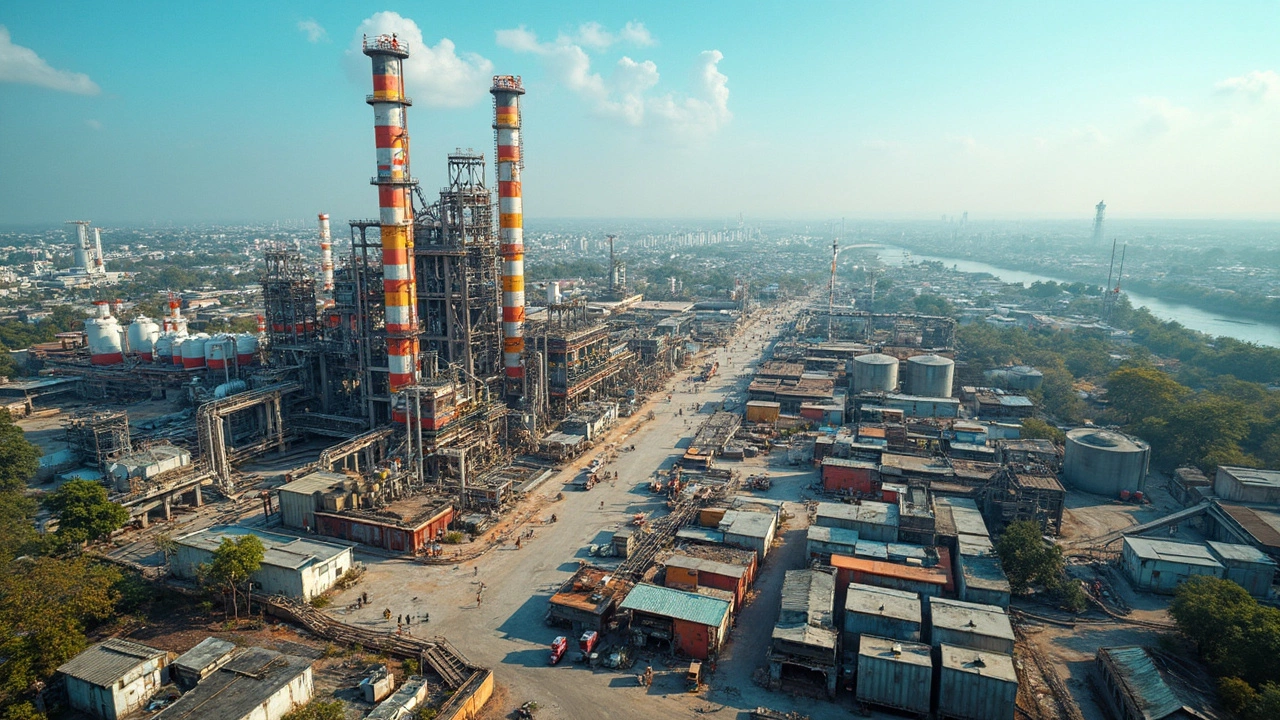- Who is the King of Steel? Andrew Carnegie's Legacy in Steel Manufacturing Feb 6, 2026
- How to Start a Manufacturing Business from Zero: Step-by-Step Guide for Beginners Nov 17, 2025
- Who Still Dumps Garbage in the Ocean: The Role of Plastic Manufacturers Apr 3, 2025
- India's Pharma Manufacturing Companies: Count, Growth, and Industry Insights Jun 29, 2025
- Who is the King of Textiles? Apr 16, 2025
Chemical Manufacturers in India – What You Need to Know
India’s chemical sector is huge, and it’s growing faster than many expect. If you’re looking for reliable suppliers, cost‑effective production, or new partnership ideas, the country offers dozens of firms that cover everything from basic petrochemicals to specialty pharma ingredients. This guide walks you through the why, who, and how of chemical manufacturing in India.
Why India is a Hub for Chemical Manufacturing
First off, raw material access gives India a solid edge. The country has large reserves of crude oil, natural gas, and minerals, which keep feedstock costs lower than in many Western markets. Add to that a government that backs the sector with tax breaks, export incentives, and a push for green chemistry, and you get a recipe for fast‑moving production.
Labor is another factor. Skilled engineers and chemists are available at competitive salaries, and many firms invest in ongoing training. This means you get high‑quality work without the premium price tag you’d see in Europe or the US. Plus, India’s logistics network—ports, rail, and highways—connects factories to domestic consumers and overseas buyers efficiently.
Key Players and What They Offer
There isn’t a one‑size‑fits‑all supplier, but a few names pop up repeatedly. Companies like GAIL and Reliance Industries dominate bulk chemicals such as ethylene, propylene, and methanol. If you need specialty chemicals, firms like SRF Limited and Balaji Amines focus on high‑value products used in pharma, cosmetics, and agro‑chemicals.
Mid‑size manufacturers are also worth a look. They often provide faster turnaround times and more flexibility on order size. Names like Deepak Nitrite and India Glycols have built reputations for consistent quality and on‑time delivery, especially for customers in Europe and North America.
When you’re scouting a partner, check a few basics: certifications (ISO 9001, ISO 14001), export history, and whether they run in‑house R&D. Companies that invest in research can tweak formulas to meet specific needs, which is a big plus for niche applications.
Pricing is transparent in most cases, but always ask for a detailed cost breakdown. Freight, customs duties, and local taxes can add up, so a supplier that offers FOB (Free on Board) pricing helps you keep control of the total spend.
Finally, think about sustainability. Many Indian manufacturers are moving toward greener processes—using bio‑based feedstocks, reducing waste, and improving energy efficiency. If your brand cares about the environment, partnering with a green‑leaning company can boost your market positioning.
Bottom line: India’s chemical manufacturers combine low‑cost inputs, skilled labor, and a supportive policy environment. Whether you need bulk petrochemicals, specialty ingredients, or a custom formulation, the market offers options that can match most budgets and quality standards. Do a quick shortlist, request samples, and compare certifications—you’ll likely find a partner that fits your needs without breaking the bank.
Which chemicals are in most demand in India's manufacturing sector?
- Aarav Sekhar
- Dec 19, 2025
Discover which chemicals are in highest demand across India's manufacturing sector in 2025, from PVC precursors to eco-friendly bleaching agents, and how industries are shifting to meet growing domestic and global needs.
Chemical Manufacturers India: Which State Leads Production?
- Aarav Sekhar
- Jun 16, 2025
Curious about which state tops chemical production in India? This article explains why one state outshines the rest, what drives its growth, and how it impacts the industry. You'll get real numbers, cool facts, and practical tips if you want to get into chemical manufacturing or understand the market. No fluff—just the facts you need. Get ready for a snapshot of India's chemical powerhouse.
Chemicals Manufactured in India: A Deep Dive into the Industry
- Aarav Sekhar
- Apr 14, 2025
India is a powerhouse in chemical manufacturing, producing everything from fertilizers to pharmaceuticals. This article delves into the various types of chemicals produced across the country, spotlighting key regions and their specialties. You'll explore India's massive output in industrial chemicals, its role in meeting global pharmaceutical demands, and the environmental challenges faced by the industry. Discover the factors that make India a critical player in the global chemical market with practical insights for those looking to engage with India's chemical sector.


